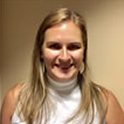
When friends heard I took on yet another commitment this school year, they were hardly surprised. Since an early age, I have never settled for a traditional one-track lifestyle. One of the greatest sacrifices my parents made for my sister and me was ensuring that we were able to take advantage of varied interests, often with grueling schedules, in order to allow our bodies and minds their fullest curiosities.
I was the weird kid who went to university lectures outside of her department, or took on three on-campus jobs not just for financial needs but because I wanted to explore their varied disciplines. I attended two different churches so that I could honor my parent’s congregation while staying connected to my home church youth group. I took more than 20 credits a semester, and often read syllabi for other courses just to spark new reading list ideas.
I’m the English teacher who saw a social studies teaching fellowship and thought, “Sure, that sounds about right.”
I can confidently say I took advantage of not just every opportunity, but went out of my way to learn new things, with new communities, in new contexts. And it still wasn’t enough for me to even come close to scraping the surface of unpacking my white, Protestant privilege.
As the world at-large seems to suddenly wake up to the systemic issues of white privilege, my own thoughts have been circling around the ways in which Christianity has not only been complicit in, but an active instigator of, the dehumanization and othering of Black, Indigenous, and People of Color (BIPOC) in the world. As my students follow the trend of increasingly rejecting organized religion in favor of individual introspection and spirituality, I have found myself wondering if it’s the more responsible choice.
But this fellowship and the community of colleagues and scholars has shown me just how limited my own understanding of the world truly has been, and that the status quo of “teaching how we were taught” simply cannot stand. As an English teacher, one of the largest burdens of lesson planning is creating units for texts you have not read as a student; the largely white, male canon persists in some ways because it is the path of least resistance for our time.
When planning a philosophy unit for my 11th and 12th graders, I literally pulled out a textbook that I (obviously) still had—complete with annotations in the margins—from my Presbyterian college’s core curriculum. This curriculum had given me Islam’s Five Pillars and an approach to Judaism akin to “just replace Sunday with Friday night and you’ll get it.”
I’ve not only examined the blind spots in my own religious identity’s history, but realized the blindness is not in the mirror, but what types of windows I’ve gazed out of from the West. We are all reckoning with how the system that produced us as students, and subsequent educators, emphasized certain pedagogical and curricular preferences for Western whiteness. If we continue to teach the literature, historical eras, artwork, environmental sustainability, philosophy, etc of our own experiences as students, why would we expect the world to produce different outcomes in our students than simply continued compliance with those systems?
My Advanced Placement Literature course is doubling in size for the 2020-21 school year. This course offers me almost complete curricular autonomy, and now an even wider audience of students from diverse identities, faiths, and interests. The tension comes in presenting a more representative list of authors and texts so as not to perpetuate Chimmamanda Ngozi Adichie’s concept of the “single story.” I’ve committed myself to revision and personal reading outside my own knowledge base in order to meet this new audience with the curriculum they deserve. I cannot continue to teach how I was taught.
 Joy Bacon is an English teacher at Baltimore School for the Arts, a public arts high school located in Baltimore, Maryland. Bacon was a member of the 2019-20 ICJS Teachers Fellowship.
Joy Bacon is an English teacher at Baltimore School for the Arts, a public arts high school located in Baltimore, Maryland. Bacon was a member of the 2019-20 ICJS Teachers Fellowship.
Opinions expressed in blog posts by the ICJS Teacher Fellows are solely the author’s. ICJS welcomes a diversity of opinions and perspectives.